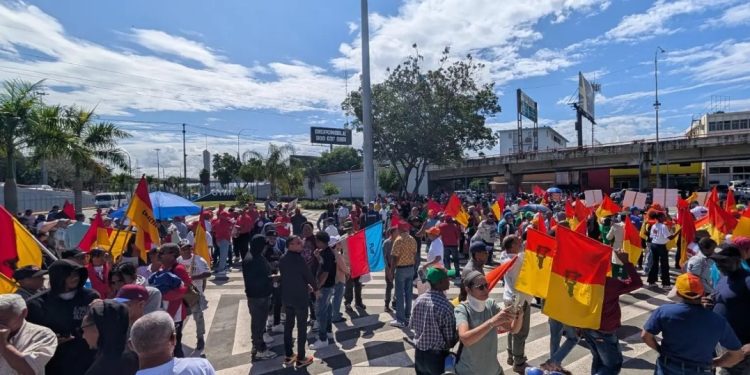By Workers’ Socialist Movement (MST), IWU-FI section in the Dominican Republic
Despite attacks by the National Police, under the orders of minister Faride Raful, and the neo-Nazi paramilitary group calling itself the Antigua Orden Dominicana (AOD), the regime, headed by President Abinader, could not prevent a large united march through the streets of Santo Domingo, commemorating, with a combative spirit, the 60th anniversary of the heroic, popular, and anti-imperialist struggle of April, 1965. The slogans “Out, out, Barrick Gold“, “Down with fascism“, “Free Palestine“, “The people, united, will never be defeated“, among many others, rang out along the route.
At the beginning of the mobilisation, at the Plazoleta La Trinitaria, agents of the National Police attacked the march with tear gas, in an attempt to disperse it and prevent it from taking place. A group of retired sugar cane workers, who have traditionally marched in the capital demanding payment of their pensions for the last two decades, were surrounded by the repressors and separated from the rest of the march. Despite this first attack, the march continued its route and arrived at ‘Independence Park’, which was completely militarised.
On April 25th, the Minister of Interior and Police, Faride Raful, had issued a statement announcing that there was no official objection to the march and that no parallel activities would be allowed to take place in the same spaces where the march was scheduled to take place. However, the government reneged on its commitment, allowing a mob of neo-Nazi paramilitaries to gather in the early hours of the morning in ‘Independence Park’ itself, who were later allowed to attack the demonstrators as they was dispersing.
When the march reached its final destination, in front of the statue of Francisco Caamaño at the entrance to Paseo El Conde, the National Police facilitated the infiltration of neo-Nazi provocateurs into the rally. These provocateurs were neutralised by the demonstrators, without being able to cause any major incidents. In these circumstances, it was not possible for the march’s manifesto to be read out, nor was it possible for the planned artistic and cultural events to take place.
As people were leaving at the end of the demonstration, and in the presence of thousands of police and military personnel, a mob of neo-Nazis attacked a column of members of various social and political organisations with stones, knives and even firearms. They were repelled, but later besieged the premises of the Escuela Multitemática and the Miguel Angel Muñiz Arias community library in Gazcue.
These events are extremely serious and endangered the lives of many people, some of them elderly, such as former combatants of the April War and retired sugar cane workers. It is once again evident what we have been denouncing for years: that the AOD functions as a new version of the Banda Colorá, the terrorist group that operated during the Balaguer dictatorship as a shock force against the popular movement and political dissidence.
The Dominican capitalist regime, with its anti-democratic characteristics and its total subordination to US imperialism, is heir to the US invasion and military occupation of 1965-66, hence its hostility to the commemoration of the April Revolution.
In her communiqué authorising the march, Minister Faride Raful had claimed that “
foreigners are not authorised to participate in political activities within the national territory“. However, this restriction does not imply that they cannot attend marches or protests, like the one today. The Constitution, the regulations of the Migration Law and the Electoral Law, refers to the restriction of foreign participation in partisan-electoral activities. That is why it is common for people of different nationalities to hold rallies and demonstrations in the country, and for many years now, sugar cane farmers have been mobilising for their pensions. The government’s attempt to prohibit the participation of Haitians in protests, while allowing people of other nationalities to participate, is part of the state of emergency that has been imposed all in practice, without the approval of Congress, and which threatens to liquidate the few democratic freedoms that we still enjoy today.
We demand respect for our democratic rights, which we have made many great sacrifices to win. They want to isolate and divide the social movement even moreso. Today, we have shown them that we will not allow this, that we will continue in the streets. The majority of the Dominican people are not fascists. This government and the fascists will not be able to prohibit solidarity and dignity. The example of the revolutionary April is still alive today, and we honour it by strengthening our organisation and mobilising. We call for the solidarity of all democratic organisations in the world that reject fascism and apartheid.













